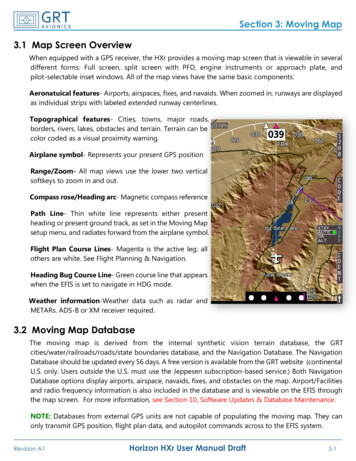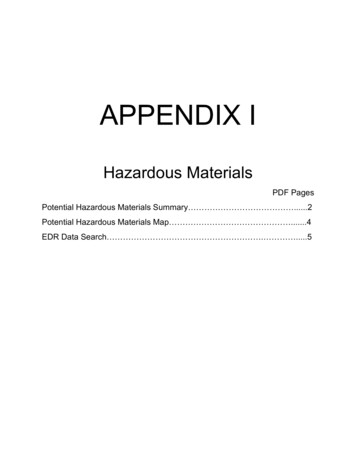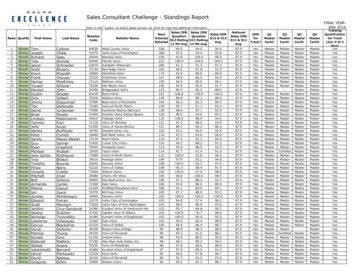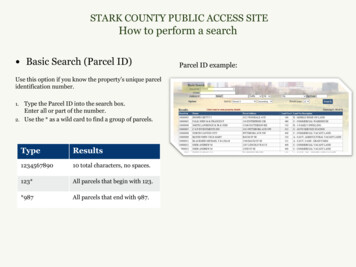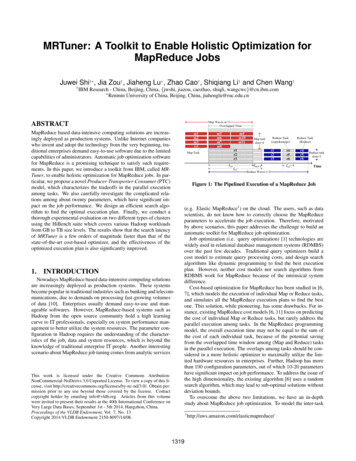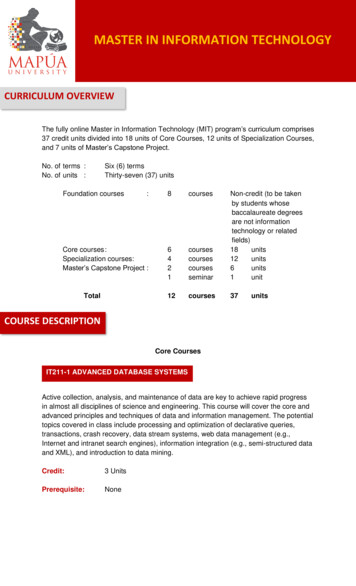
Transcription
MASTER IN INFORMATION TECHNOLOGYCURRICULUM OVERVIEWThe fully online Master in Information Technology (MIT) program’s curriculum comprises37 credit units divided into 18 units of Core Courses, 12 units of Specialization Courses,and 7 units of Master’s Capstone Project.No. of terms :No. of units :Six (6) termsThirty-seven (37) unitsFoundation courses:8coursesCore courses :Specialization courses:Master’s Capstone Project :6421coursescoursescoursesseminarNon-credit (to be takenby students whosebaccalaureate degreesare not informationtechnology or TotalunitsCOURSE DESCRIPTIONCore CoursesIT211-1 ADVANCED DATABASE SYSTEMSActive collection, analysis, and maintenance of data are key to achieve rapid progressin almost all disciplines of science and engineering. This course will cover the core andadvanced principles and techniques of data and information management. The potentialtopics covered in class include processing and optimization of declarative queries,transactions, crash recovery, data stream systems, web data management (e.g.,Internet and intranet search engines), information integration (e.g., semi-structured dataand XML), and introduction to data mining.Credit:3 UnitsPrerequisite:None
IT212-1 ADVANCED SYSTEMS INTEGRATION AND ADMINISTRATIONThis is an advanced course in systems analysis and design that presents conceptualmaterial about both traditional approaches to systems development such as processoriented and data-oriented methodologies and evolving approaches such as objectoriented development methods. Key stages of the systems development life cycleincluding planning, analysis, and design are the focus of this course. Models andprocedures for understanding and modeling an organization’s existing and plannedinformation systems are presented.Credit:3 UnitsPrerequisite:NoneIT213-1 TECHNOLOGY AND PROJECT MANAGEMENTThis course is an introduction to the basic processes of project management forinstructional design projects. Students will be introduced to organizational issues,methods of planning, and techniques for managing the business and creative processesthat determine the success of a project. Students will learn to use project managementsoftware for organizing, scheduling, and monitoring project progress.Credit:3 UnitsPrerequisite:NoneIT214-1 ADVANCED OPERATING SYSTEM AND NETWORKINGThis course will discuss advanced topics and research issues in computer andoperating systems. Topics will be drawn from a variety of operating systems-relatedareas such as distributed systems and languages, networking, security, and protection,real-time and embedded systems, modeling and analysis, principles andimplementations of operating systems and networking.Credit:3 UnitsPrerequisite:NoneIT215-1 ADVANCED WEB SYSTEMS AND TECHNOLOGIESThis course will introduce concepts in programming web application servers. At theconclusion of this course students will understand the fundamental concepts of softwareengineering and how they apply to web application design and programming, will knowthe modern tools used to program web application servers, and will be able to producesubstantial web applications. This course will introduce web application concepts usingthe latest or current technology used in the market, and students will be able togeneralize these concepts to other web application technologies and tools.Credit:3 Units
Prerequisite:NoneIT291 METHODS OF RESEARCHThis course introduces students to several research methods useful for academic andprofessional investigations of information practices, texts, and technologies. Byexamining the applications, strengths, and major criticisms of methodologies drawnfrom both the qualitative and quantitative traditions, this course permits anunderstanding of the various decisions and steps involved in crafting and executing aresearch methodology, as well as a critically informed assessment of publishedresearch.Credit:3 UnitsPrerequisite:NoneSpecialization CoursesNetwork Management TrackIT231-2 NETWORK MANAGEMENT 1A graduate course on enterprise network architecture. This course develops the skillsneeded to design and plan the implementation and maintenance of a diverse networkenvironment that meets the needs of an organization’s enterprise architecture. Studentswill evaluate various framework models currently used by businesses and governmentagencies and apply those models to the development of a network architecture thatconsiders an organization’s needs related to their business processes and theirtechnical requirements for data, information, communication, software applications, andsecurity.Credit:3 UnitsPrerequisite:NoneIT232-2 NETWORK MANAGEMENT 2This course presents the principles and practices of network administration. Studentswill evaluate and recommend specific IT infrastructure processes and current bestpractices in areas such as network configuration, user management, backupmanagement, high-reliability configuration, and system security. Network issues such asinteroperability, addressing, and routing are examined.Credit:3 UnitsPrerequisite:IT231-1
IT233-2 NETWORK MANAGEMENT 32A graduate-level course on network security. Students are provided with a briefoverview of the basic elements of networking concepts, topologies, protocols andthreats necessary to understand network security issues and make security relevantdecisions. An in-depth analysis of the Open Systems Interconnection (OSI) model andlayered network security mechanisms needed to provide Confidentiality, Integrity,Availability, Authorization, Authentication and Non-repudiation within a networkenvironment is included. This course includes a treatment of cryptography andcryptographic services. An implementation plan and formal paper are required.Credit:3 UnitsPrerequisite:IT232-1IT234-2 NETWORK MANAGEMENT 42This is a graduate-level course on network governance and risk assessment. Effectivestrategy and policy development are the keys to unlocking the value of technology for abusiness. Students will learn to evaluate various strategies and apply them to thebusiness needs of an organization through the development and effectivecommunication of network and IT policies. The principles of network and IT governance,goal alignment, risk management, policy development, process establishment andcontinuous improvement are applied to construct an effective information technologyservice that improves performance and competitiveness within the organization.Credit:3 UnitsPrerequisite:IT233-1Data Analytics TrackIT251-2 DATA ANALYTICS 12This course deals with the current programming tools used in Data Analytics such asSAS, Python, MATLAB, and R Programming. It covers the syntax and semantics ofthese programming languages for data creation, preparation, manipulation and datacleansing.Credit:3 UnitsPrerequisite:NoneIT252-2 DATA ANALYTICS 22This course introduces the data analytics life cycle and focuses on data visualization. Itcovers how to present data in various formats to target audience. This course alsointroduces dash boarding and its components.Credit:3 Units
Prerequisite:IT251-1IT253-2 DATA ANALYTICS 32This course covers data analysis and design, data warehouse, data marts, andintroduction to data mining. This course covers Big Data and its characteristics.Credit:3 UnitsPrerequisite:IT252-1IT254-2 DATA ANALYTICS 42This course covers the data modeling and deployment phases of data analytics. Itcovers predictive and prescriptive analytics. It also introduces new analytical modellingusing machine learning and deep learning.Credit:3 UnitsPrerequisite:IT253-1Capstone ProjectIT300-1 MASTER'S CAPSTONE PROJECT 1This course will require student to propose a capstone project that will introduce either anew application, technology, or process that can be used as a tool to solve anorganizational or societal problem.Credit:3 UnitsPrerequisite:IT291IT300-2 MASTER'S CAPSTONE PROJECT 2In this course the student will present the final output (system and documentation) ofhis/her capstone project to the School of IT.Credit:3 UnitsPrerequisite:IT300IT298 GRADUATE RESEARCH AND SEMINARA course required of all graduate students who are prospective candidates for theMaster's Degree. Students shall be required to attend local, national, or internationalconference related to information technology, and/or present paper relating to thecapstone project.
Credit:1 UnitPrerequisite:IT300Bridging CoursesCS201-1Computer Programming 13 unitsCS202-1Computer Programming 23 unitsIT203-2Human Computer Interaction3 unitsIT204-23 unitsIT205-2Computer Networks and DataCommunicationsSystems ParadigmsIT206-2Web Systems and Technologies3 unitsIT207-2Platform Technologies3 unitsIT208-2Information Management3 units3 unitsPROGRAM SCHEDULEYear 1Quarter 1IT211-1Advanced Database SystemsIT214-1Advanced Operating System andNetworkingQuarter 2IT212-1IT215-1Advanced Systems Integration andAdministrationAdvanced Web Systems andTechnologiesQuarter 3Specialization 1IT213-1Technology and Project ManagementQuarter 4Specialization 2IT291Methods of Research
Year 2Quarter 1Specialization 3IT300-1Master's Capstone Project IQuarter 2Specialization 4IT300-2Master's Capstone Project IIIT298Graduate Research and SeminarSpecializationNetwork Management TrackIT231-2Network Management 1IT232-2Network Management 2IT233-2Network Management 3IT234-2Network Management 4Data Analytics TrackIT251-2Data Analytics 1IT252-2Data Analytics 2IT253-2Data Analytics 3IT254-2Data Analytics 4PROGRAM COSTCost per 3 - unit course: Php 12,700 (tuition and miscellaneous)Program cost: P 12,700 x 12 Php 152,400Php 152,400 Php 4,233.33 (1 unit graduate seminar)Total program cost: Php 156,633.33
FAQsWhat background is necessary for the fully online Master in InformationTechnology?To be accepted in the graduate program, prospective graduate students should have anundergraduate degree in any of the following fields: Information Technology, ComputerScience, or Information Systems. Bachelor’s degree holders in Computer Engineeringand Electronics Engineering may also take the fully online MIT program provided they willcomplete bridging courses.How do I apply for the program?Applicants need only to fill out the online application form and to submit scanned copiesof their transcript of records, two recommendation letters, and an English languageproficiency certification – TOEFL, TOEIC, IELTS or equivalent (for foreign students) here.Original copies of the requirements must be sent to the registrar at:Office of the University RegistrarMapúa University658 Muralla StreetIntramuros, ManilaPhilippines 1002Graduates from abroad must submit the original copies of requirements authenticated bythe Philippine Consulate General (with red ribbon and seal).How many course units are required to complete the program?A student should earn 37 course units to complete the fully online MIT program.How quickly can I complete the program?As Mapúa University’s Academic Year follows a quarter system, a student can completethe fully online MIT program in six (6) quarters, subject to other graduation requirements.
The fully online Master in Information Technology (MIT) program's curriculum comprises 37 credit units divided into 18 units of Core Courses, 12 units of Specialization Courses, and 7 units of Master's Capstone Project. No. of terms : Six (6) terms No. of units : Thirty-seven (37) units
